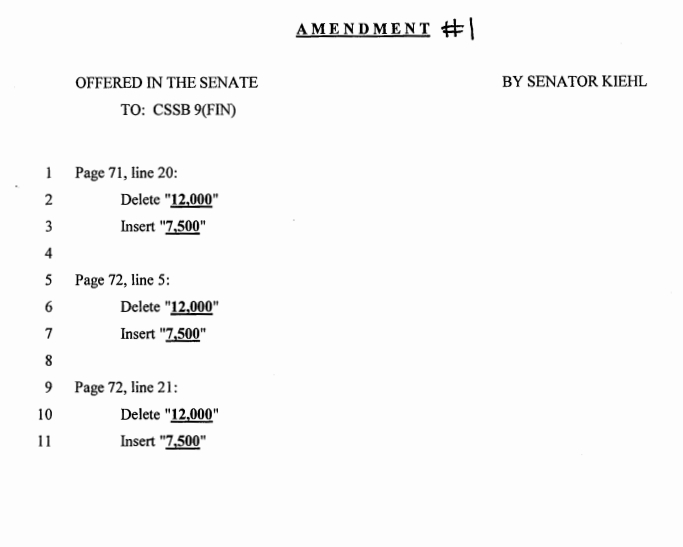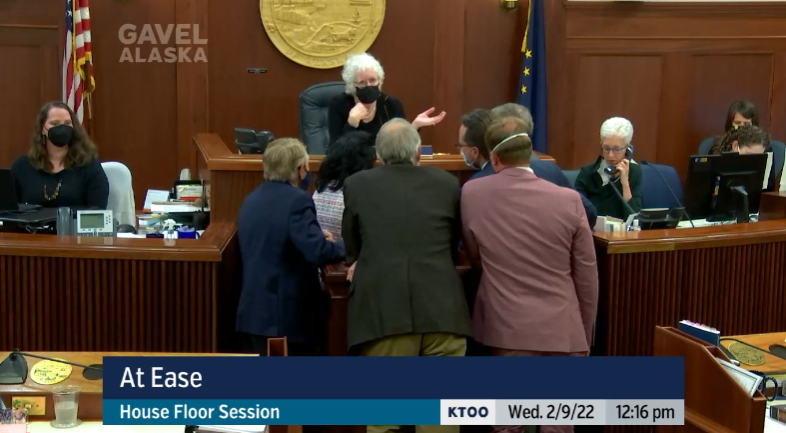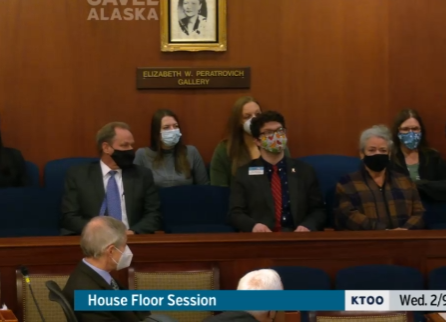
Over in the Senate floor, they're working through amendments on Senate Bill 9. It's Senate President Peter Micciche's long-delayed alcohol law rewrite.
👀: w3.akleg.gov/includes/_play…
📄: akleg.gov/basis/Bill/Det…
#akleg
👀: w3.akleg.gov/includes/_play…
📄: akleg.gov/basis/Bill/Det…
#akleg
Amendment 1 was by Sen. Kiehl. It would've loosened the strict population limits the bill would place on tasting rooms (effectively closing many markets to any new entrants) but he says in the interest of trying to get this bill—which was first introduced in 2015—he withdraws it. 

After the long at-ease, Senate President Micciche notes that there's objection to withdrawing Sen. Kiehl's amendment. Sen. Begich says he supports withdrawing it, but supports the amendment, too.
Sen. Donny Olson is making the motion against withdrawing it.
Sen. Donny Olson is making the motion against withdrawing it.
Sen. Costello: "once an amendment is offered on the body it now belongs to the body."
Sen. Olson says he offered a similar amendment in the Senate Finance Committee but withdrew it there because he was told he'd have an opportunity to vote on it on the floor.
It's withdrawn on a 10Y-8N vote.
It's withdrawn on a 10Y-8N vote.

That's it for amendments.
Sen. Stevens leads off debate on the bill, carrying it for Senate President Micciche.
As said earlier, Micciche has been attempting to get this bill done since 2015.
Sen. Stevens leads off debate on the bill, carrying it for Senate President Micciche.
As said earlier, Micciche has been attempting to get this bill done since 2015.
Stevens says that it's an effort to bring together differing, competing interests like liquor industry, bars and substance abuse groups.
He says everyone's currently on board (which is why they can't risk any amendments on the floor or else CHARR will spike it again)
He says everyone's currently on board (which is why they can't risk any amendments on the floor or else CHARR will spike it again)
Sen. Costello asks about the bill's extended tasting room hours, which would move from 8 p.m. to 10 p.m. She wonders if it's really a hard close or whether it's more flexible.
Here's the language, which says "may not enter a premises" between 10 p.m. and 9 a.m.
Brief at-ease.
Here's the language, which says "may not enter a premises" between 10 p.m. and 9 a.m.
Brief at-ease.

A layman's reading does seem to have some wiggle room. You can't ENTER after 10 p.m. but if you're already there are you good?
And if you look at another section relating to tasting rooms, though, there's a hard cut off at 10 p.m. when it comes to serving. So, no, there's not some no secret loophole to keep the party going.
Stevens says it's a hard close.
Stevens says it's a hard close.

Sen. Olson says he doesn't support the strict limits on tasting rooms: "Let's let the free market decide ... not some bureaucrat who has no experience where the rubber meets the road and certainly not politicians because politicians come and go."
Sen. Stevens says it's not a special interest bill: "Everyone gave and got something important to them" (like stricter limits on tasting rooms).
And Senate Bill 9 has passed the Senate on a 18-0 vote.
This is the third time it passed the Senate.
#akleg
This is the third time it passed the Senate.
#akleg

Now onto HJR 16, which is a resolution supporting Hmong soldiers' access to federal veteran benefits.
17 of the 20 senators have already signed on as co-sponsors.
17 of the 20 senators have already signed on as co-sponsors.

And make that 20 senators in support after Sens. Wilson, Kiehl and Hoffman sign on as cross sponsors.
And into special orders, Sen. Reinbold is talking about some anti-vax listening session she held in Juneau: 

• • •
Missing some Tweet in this thread? You can try to
force a refresh













